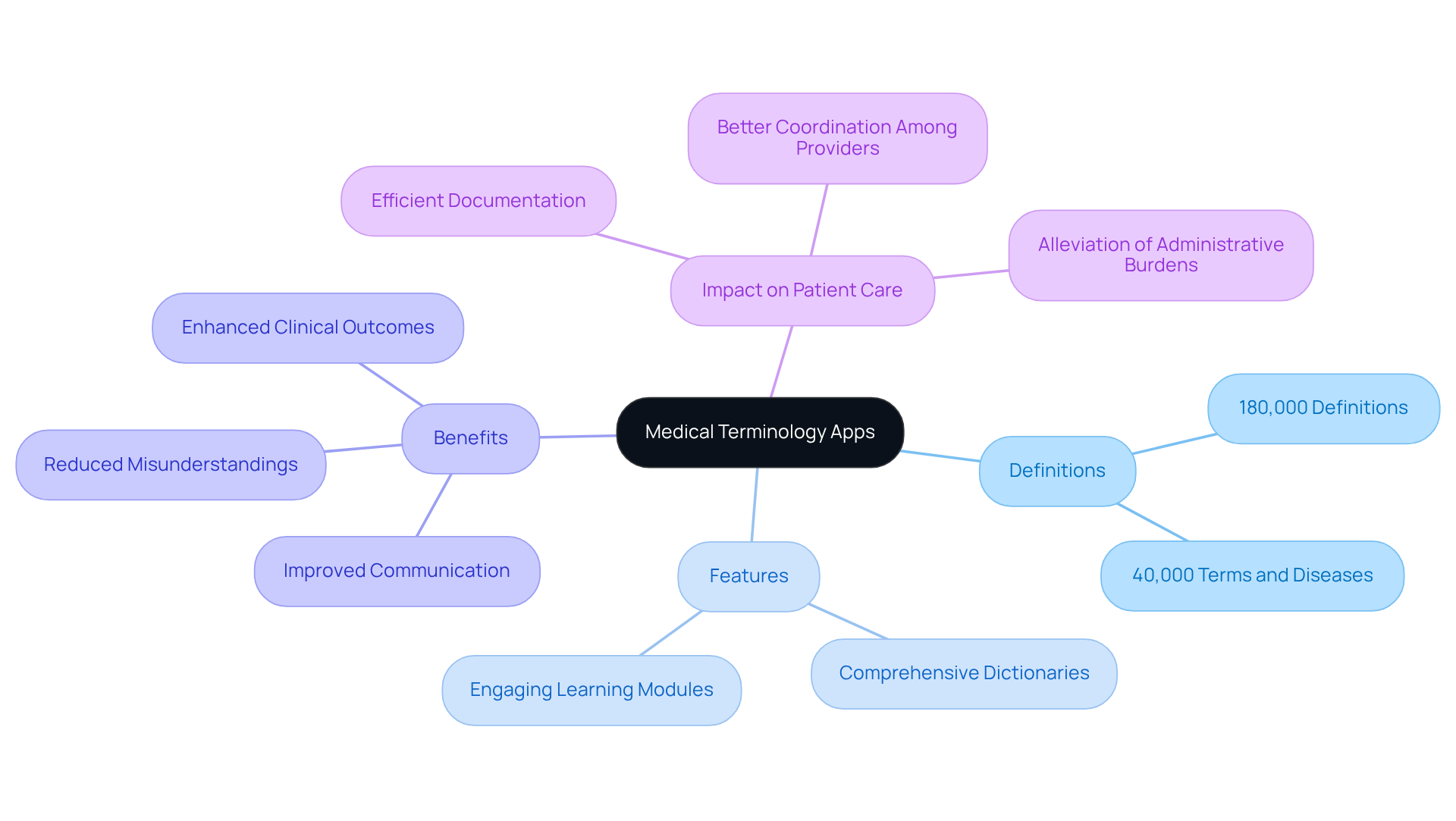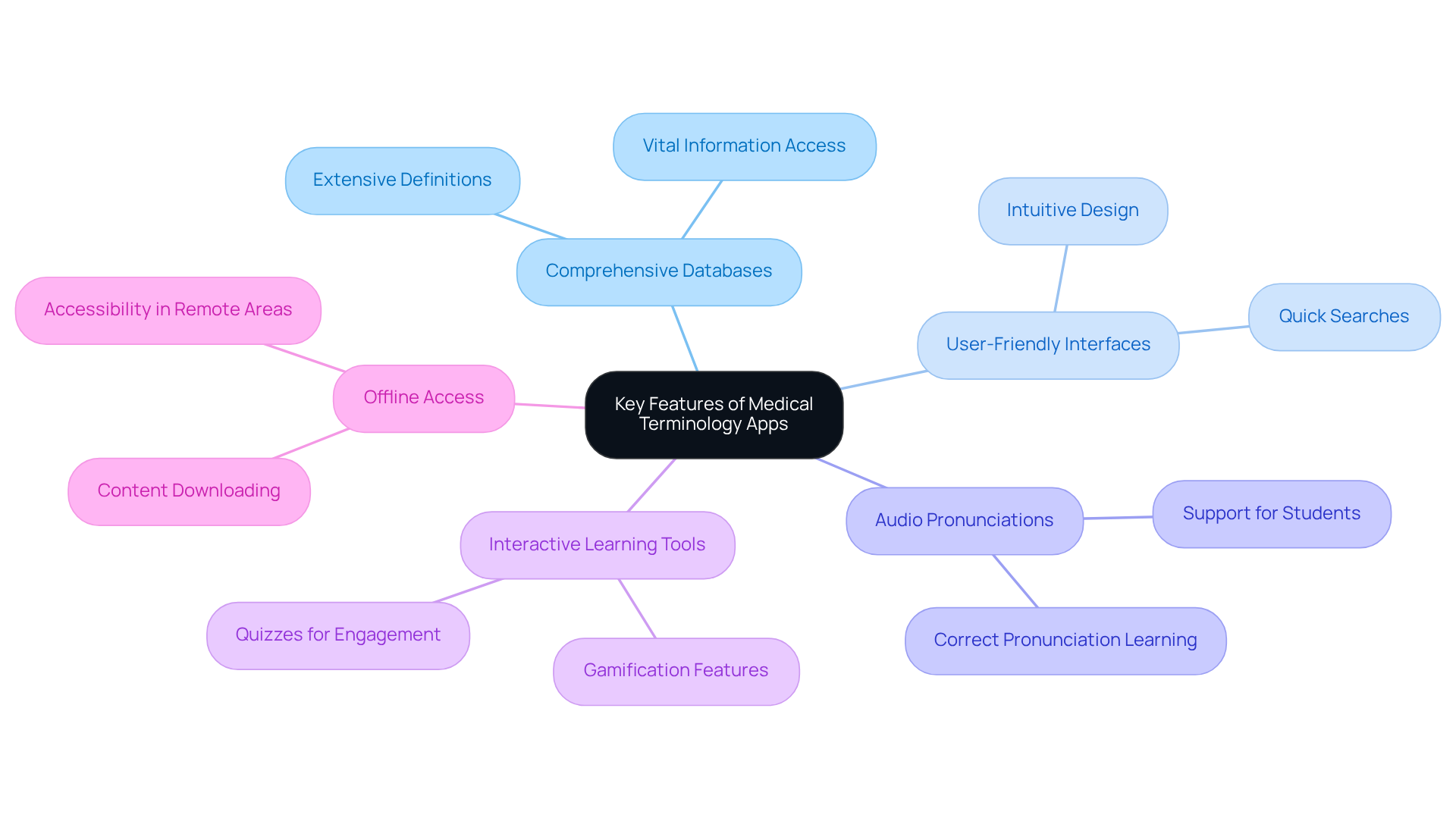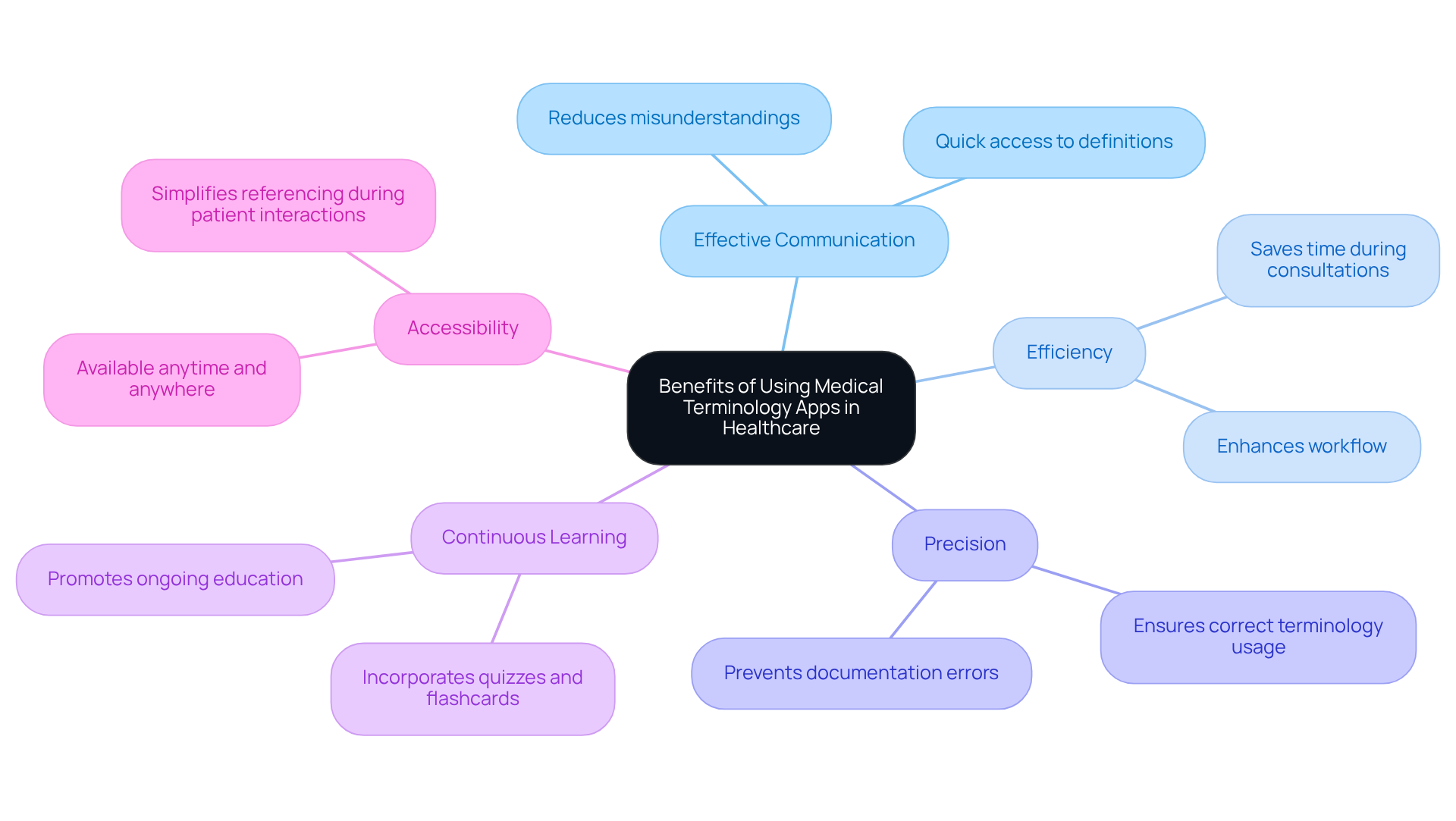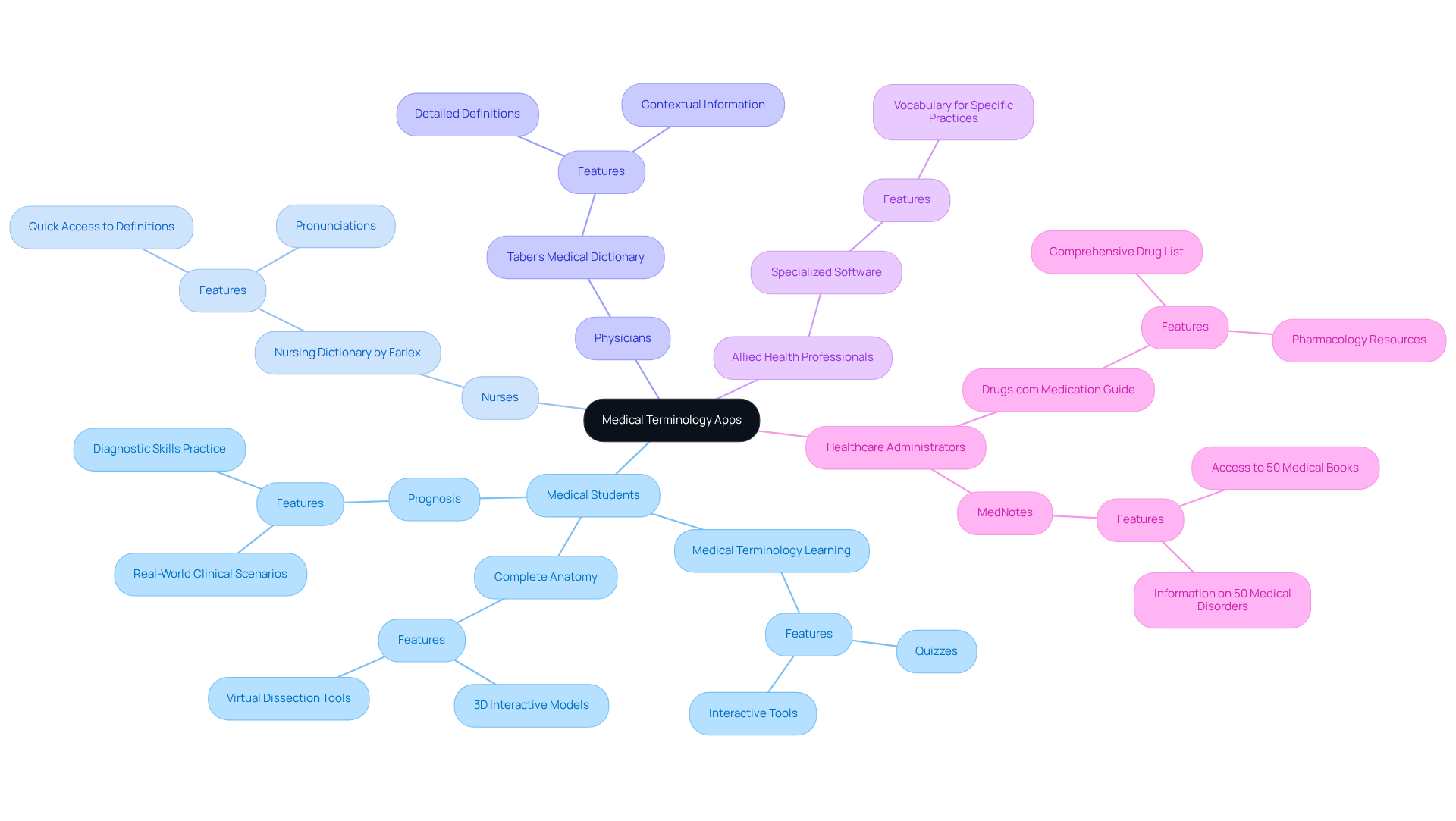Overview
In today's demanding healthcare environment, providers often face emotional challenges that can impact their ability to deliver optimal patient care. Administrative burdens can weigh heavily, making it difficult to access crucial information quickly. This is where medical terminology apps come into play, offering solutions that not only enhance communication but also improve efficiency and ongoing education.
These apps are designed with the diverse needs of healthcare professionals in mind. They provide quick access to essential medical information, tailored to fit various roles within the medical field. Imagine having the ability to retrieve vital data at your fingertips, allowing you to focus more on what truly matters—your patients.
By utilizing these tools, healthcare providers can experience a significant boost in their workflow, ultimately leading to improved patient care and safety. The benefits are clear:
- Enhanced communication
- Greater efficiency
- Ongoing education opportunities
How might your practice change if you had immediate access to the information you need?
We encourage you to explore these medical terminology apps further. They could be the key to alleviating some of the burdens you face daily, allowing you to provide the compassionate care your patients deserve. Let’s embrace these tools together and continue to improve the healthcare experience for everyone involved.
Introduction
In the complex world of healthcare, where effective communication is essential, medical terminology apps stand out as vital resources for professionals. These tools not only make it easier to navigate intricate medical language but also significantly improve patient care by promoting clarity and efficiency. Yet, with so many options available, how can healthcare providers choose the app that truly meets their individual needs?
This article explores the features, benefits, and suitability of leading medical terminology apps. By delving into these insights, we aim to empower you to make informed choices that enhance your pursuit of excellence in patient care. Remember, every decision you make can lead to a more supportive and effective healthcare environment for both you and your patients.
Overview of Medical Terminology Apps
Medical professionals find medical terminology apps vital, as they provide quick access to definitions, explanations, and contextual uses of medical terms. Have you ever felt overwhelmed by the intricate language of medicine? These medical terminology apps are designed to ease that burden by ensuring precise communication, documentation, and patient care.
With features ranging from comprehensive dictionaries to engaging learning modules, medical terminology apps cater to the diverse needs within the medical field. They empower providers to deliver knowledgeable and efficient care. For instance, the Medical Dictionary by Farlex offers over 180,000 definitions, while the medical terminology apps, such as the Medical Terminology Dictionary app, include more than 40,000 terms and diseases. Imagine the confidence that comes from having such resources at your fingertips.
The incorporation of medical terminology apps not only enhances communication efficiency but also contributes to improved clinical outcomes. Medical professionals can swiftly consult medical terminology apps, which reduces the chances of misunderstandings and mistakes in patient care. Moreover, medical terminology apps can bridge gaps in medical systems, fostering better communication and coordination among providers. This is especially important in light of regulatory challenges like HIPAA, which can complicate effective communication.
By embracing medical terminology apps, healthcare providers can alleviate some of the administrative burdens that often detract from patient care. Are you ready to explore how these tools can transform your practice? Together, we can enhance the quality of care and ensure that every patient receives the attention they deserve.

Key Features of Leading Medical Terminology Apps
Healthcare providers often face emotional challenges in their demanding roles. Leading medical terminology apps are designed with these providers in mind, offering features that not only improve usability but also enhance learning. These tools can make a significant difference in patient care.
- Comprehensive Databases: Applications like Taber's Medical Dictionary and Medical Dictionary by Farlex provide extensive databases filled with definitions and explanations crucial for clinical practice. This ensures that users have access to vital information, which is essential for effective patient care.
- User-Friendly Interfaces: Many applications prioritize intuitive design, allowing for quick searches and seamless navigation. The medical terminology apps exemplify this, ensuring that users can efficiently access the information they need. User-friendly interfaces are fundamental for enhancing the learning experience in healthcare education.
- Audio Pronunciations: To support the mastery of healthcare vocabulary, various software include audio features that assist users in learning the correct pronunciation of terms. This is especially beneficial for students and early-career professionals, aligning with the critical need for accurate communication in clinical settings.
- Interactive Learning Tools: Apps like MediLingo engage users through gamification and quizzes, making the learning process enjoyable and effective. These interactive tools significantly enhance user engagement and knowledge retention, addressing the need for effective learning methods.
- Offline Access: Certain applications allow users to download content for offline use, ensuring that healthcare providers can access essential information even in areas with limited internet connectivity. This feature is particularly important for those working in remote locations or during emergencies.
By leveraging medical terminology apps, healthcare providers can alleviate some of the burdens they face, ultimately leading to improved patient care and a more fulfilling professional experience. Explore these tools and discover how they can support you in your vital role.

Benefits of Using Medical Terminology Apps in Healthcare
In the demanding world of healthcare, effective communication is crucial. Medical terminology apps, such as MediLingo, provide a compassionate solution to the challenges that providers encounter. By providing quick access to definitions and explanations, medical terminology apps assist healthcare providers in communicating more effectively with colleagues and patients, thereby reducing misunderstandings. As Nic, a practitioner engaged in the app's development, shares, "Using our combined experience and expertise, we’ve created MediLingo, an improved method to learn health-related vocabulary."
Efficiency is another significant benefit. Medical terminology apps simplify the process of searching for terms, allowing precious time to be conserved and redirected towards patient care. With MediLingo's quick search functionalities, providers can swiftly find information during consultations, enhancing their workflow and allowing them to focus more on what truly matters—patient care.
Precision is essential in healthcare, as the correct application of medical language directly impacts patient safety. Medical terminology apps such as MediLingo assist in ensuring that medical providers use the correct terms, which can prevent mistakes in documentation and treatment. This attention to detail fosters a safer environment for patients and builds trust in healthcare.
Moreover, MediLingo supports continuous learning. Incorporating language learning strategies and features such as quizzes and flashcards, it promotes ongoing education. This empowers professionals to remain informed about clinical language and expressions, nurturing a culture of enhancement and growth.
Accessibility is a vital aspect of modern healthcare. With mobile applications like MediLingo, providers can access resource materials anytime and anywhere. This flexibility simplifies referencing terms during patient interactions, ensuring that high-quality care is always within reach, even in fast-paced environments.
In summary, integrating medical terminology apps such as MediLingo not only enhances communication and efficiency but also supports ongoing education and improves patient safety. By embracing these tools, healthcare providers can navigate their challenges with confidence and compassion.

Suitability of Medical Terminology Apps for Different Healthcare Providers
Designed with the diverse needs of healthcare providers in mind, medical terminology apps recognize the unique challenges they face in their daily roles.
Medical students striving to master complex terms swiftly can benefit from medical terminology apps like Medical Terminology Learning, which offer valuable features such as quizzes and interactive tools. These resources not only support their educational journey but also enhance organization and productivity. Consider Complete Anatomy, which provides 3D interactive models and virtual dissection tools, making it easier to memorize anatomical terms. Additionally, the Prognosis app simulates real-world clinical scenarios, allowing students to practice and refine their diagnostic skills.
Nurses: Nurses require tools that provide quick access to definitions and pronunciations to facilitate effective communication with patients and colleagues. The Nursing Dictionary by Farlex is an excellent option for this purpose, ensuring that nurses can connect with those they care for more effectively.
Physicians: Physicians often benefit from comprehensive resources like Taber's Medical Dictionary, which offers detailed definitions and contextual information that can aid in clinical decision-making. This support is crucial as they navigate complex patient cases.
Allied Health Professionals: Experts in fields such as physical therapy or radiology can utilize specialized software focused on vocabulary pertinent to their practices. This ensures they are equipped with the necessary tools to excel in their roles and provide the best care possible.
Healthcare Administrators: Administrators face their own set of challenges and may prefer apps that include billing codes and administrative terminology. This helps them effectively manage the business side of healthcare. For instance, the Drugs.com Medication Guide aids healthcare students in understanding pharmacology with a comprehensive list of drugs and resources. Moreover, MedNotes offers access to over 50 medical books and information on 50 medical disorders, providing a wealth of knowledge at their fingertips.
In a field where every detail matters, medical terminology apps act as essential companions, assisting healthcare providers in navigating their responsibilities with confidence and compassion.

Conclusion
Healthcare providers often face emotional challenges that can impact their ability to deliver the best patient care. Embracing medical terminology apps can be a vital step towards alleviating these burdens. By simplifying the complex language of medicine, these tools empower professionals to navigate their roles with greater confidence and accuracy.
Imagine having access to comprehensive databases and user-friendly interfaces right at your fingertips. Medical terminology apps provide interactive learning tools that cater to the diverse needs of various healthcare roles, from medical students to seasoned physicians. This accessibility fosters a culture of continuous learning, addressing the specific challenges faced by each professional.
The benefits of adopting these innovative applications are profound. By integrating them into daily practice, healthcare providers can enhance their communication and efficiency, ultimately improving patient outcomes. This approach cultivates a more informed, compassionate, and efficient atmosphere in medical practice, paving the way for a brighter future.
As we look ahead, consider how these tools can transform your practice. By leveraging medical terminology apps, you can not only support your own professional growth but also contribute to a culture of safety and excellence in patient care. Together, let’s embrace these solutions for a more nurturing healthcare environment.




